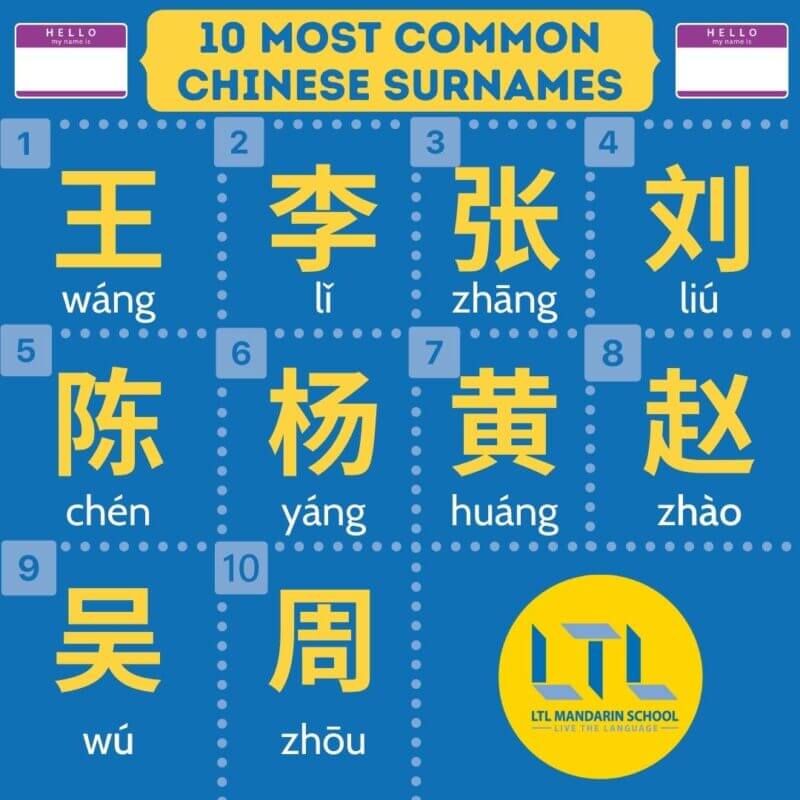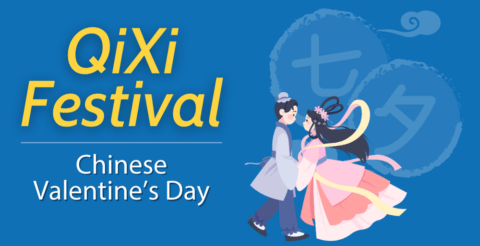Choosing a Chinese Name | 5 Names From 5 Native Speakers + How You Can Choose Yours

Have you ever met someone with an unusual English name that made you crack up?
Maybe you’ve come across an Elvis, a Bunny or (as I once did at university) a Window.
That half-amused, half-bemused feeling is exactly how a lot of Taiwanese people responded to my Chinese name: 涵涵 Hánhán...
Therefore I decided to go on a quest.
A quest to find the perfect Chinese name.
This article documents my journey in choosing a Chinese name that didn’t give me that half-amused, half-bemused look!
Choosing a Chinese Name || Chinese Name Structure
Choosing a Chinese Name || Double Character Names
Choosing a Chinese Name || My Mistake!
Choosing a Chinese Name || A Foolproof Method
Choosing a Chinese Name || My Five Options
Choosing a Chinese Name || The Verdict
Choosing a Chinese Name || FAQs
Choosing a Chinese Name: Chinese Name Structure
TOP TIP || For a simple and easy guide on how Chinese names work, check out our Chinese name blog!
For those of you who don’t know, Chinese names consist of a family name first, followed by one or two characters, which make up the given name.
For example…

In the case of Bruce Lee, 李 Lǐ is his family name and 小龙 Xiǎolóng is his given name.
Believe it or not, Bruce wasn’t “Bruce Lee” at birth!
When choosing your Chinese family name, to sound more authentic, you might want to use one of the 10 most common surnames in China.
No worries if you don’t know them, because we do. Check it out:

Did you know? 李 Lǐ, 王 Wáng and 张 Zhāng are so popular that 85% of China’s population has one of these three family names!
Choosing a Chinese Name: Double Character Names
My name, 涵涵 Hánhán, is a double-character name.
A double-character name is just like a regular Chinese name, except that in this case there are two of the same characters, usually following the family name.

Now, in mainland China, where I used to live, double-character names are more than acceptable.
As a previous teacher in China, many of my previous students across all age groups had names with repeating characters.
So when it came to choosing a Chinese name for myself, 涵涵 Hánhán felt like a great fit.
I loved this name as it was the nickname of one of my close Chinese friends and just like my English name, Hannah, I could write it backwards and it would still be the same (which felt cool at the time).
BONUS RESOURCE | Discover your Chinese name! If by now you’re feeling curious about what your Chinese name might be, check out our Chinese name generator
Choosing a Chinese Name: My Mistake!
However, in Taiwan, 涵涵 has proven to be pretty controversial.
I’ve received reactions ranging from incredulity to outright dislike. Double-character names are a big no-no here as they sound like nicknames given to young children.
The final straw for me came when someone told me my name sounded like a special kind of ‘masseuse’… after that, I knew it was definitely time to find an alternative!
Although on that note, after some brief inter-web investigations, I was pretty relieved to find out it wasn’t just me who’d made mistakes when choosing a Chinese name…
Choosing a Chinese Name: A Foolproof Method
Choosing a Chinese name was therefore an important task for me, so I needed expert help.
To avoid any similar pitfalls in future, I decided to ask five different native Chinese speakers to give me a Chinese name.
I wanted to have as much variety as possible, so the people I asked included a university classmate, university professors and of course, Chinese teachers!
That way I’d have plenty to choose from and would avoid any less-than-impressed reactions in future.
The time and thought each person put into creating each name left me genuinely touched, and a little spoiled for choice!
On that note, here they are:
Choosing a Chinese Name: My Five Options
Name 1: 栩葵 Xǔkuí
Why
“We gave you this name because 栩 means lively and we think you’re very 活泼 (huópō, lively).
葵 means sunflower, which we chose because we think you’re optimistic and want you to stay that way.
Sunflowers also always face the sun and you were born at midday, when the sun is strongest.”
Name 2: 涵怡 Hányí
Who?
Betty, NTUE Masters Student
Why?
“I gave you the name 涵怡 Hányí because I feel like you are actually LOVE and you are like a love and happiness spreader.
It’s a little too direct to use 愛 in a name, so I looked for some characters with the 心 radical.
Then I thought of 怡.
It describes a person who is relaxed, comfortable when embraced by Mother Nature and lets others have this kind of feeling and feel joyful.
Looking at the components of 怡,心 is about feeling and love, and 台 can be a memory of your life in Taiwan.
涵 is really a beautiful character, and suits you because you want people around you have love and happiness too.
I feel that this character has a strong but silent confidence. It’s strong because it is used to describe people who know a lot.
It’s silent because people with this name don’t show off.
Therefore they are easy-going, but if other people know them a little more, they will know that people with this character are truly something and they are truly humble too. The definition of 涵 is to contain, to immerse, just like how you want to share harmony with the people around you.
Plus, 涵 is the character you chose for yourself, so I can never tear you and 涵 apart. At least keep one 涵 for yourself!”
Name 3: 賈依娜 Jiǎ Yīnà
Who?
Yun-Ping, University Professor
Why?
“I used the sounds of your English name to choose your Chinese name,賈依娜 Jiǎ Yīnà.
The family name 賈 is based on the first syllable of your last name “Garbett”.
The second character, 依, is based on your middle name “Elizabeth” and the third character 娜 is from the second syllable of your first name, “Hannah”.
Name 4: 貝妍熹 Bèi Yánxī
Who?
Penny, LTL Teacher
Why?
“I chose the name 貝妍熹 Bèi Yánxī for you.
貝 bèi is used in characters for wealth and money, so I hope that you will be rich in your life, it also sounds like the second half of your last name ‘Garbett’.
妍 yán means beautiful.
I think you are beautiful now and will be 40 years later, so at that time people will still ask you where you are studying!
熹 xī means bright and warm, I think you’re a warm person and you were born at midday, when it’s brightest.”
Name 5: 高伊函 Gāo Yīhán
Who?
Elrine, University Chinese Teacher
Why?
“The name I have chosen for you is 高伊函 Gāo Yīhán.
In terms of the pronunciation of this name, I chose characters that sound uplifting. I also hope that with this name, you will flourish in the future.
I chose a name that has 24 strokes because according to 黃曆 huánglì, The Chinese Calendar, a name with 24 strokes represents 吉jí, meaning lucky.
Therefore, this name will bring you good fortune!
As for the individual names, I chose 高 based on your English surname, as the pronunciation is similar.
I chose 伊 because on one hand because its pronunciation is similar to your middle name, Elizabeth.
It also refers to the customary words used in our country to translate the name of the Queen of England!
Finally, I chose 函 as it is similar to the pronunciation of Hannah. This character also means “armor” and “tolerance”.
Choosing a Chinese Name: The Verdict
The verdict: I love them all!
Each name is wonderful and meaningful in its own unique way.
That being said, my personal highlights are:
怡 yí to represent love and Taiwan
熹 xī, as I think this character is aesthetically beautiful. Plus it means warmth and brightness and links back to the time of day I was born.
葵 kuí, which represents optimism, and coincidentally my favourite flower: sunflowers!
The whole of 高伊函 Gāo Yīhán, with its 24 lucky strokes and link to the Queen. A very British name for a British person!
Through this little experiment, I’ve learned that a name can be a gift from one person to another and really does carry a lot of meaning.
It’s also made me realise that Chinese names shouldn’t be chosen lightly and always benefit from the insights of native speakers.
I’m still trying to decide on which name to use, so if you have a favourite from the list, do get in touch with a comment and let me know!
Choosing a Chinese Name || FAQs
Do I really need a Chinese name?
When learning Chinese, it can really help to have a Chinese version of your name, as it’s easier for your new Chinese friends and colleagues to remember.
Having a Chinese name can also make you feel a lot more immersed in the language and culture.
However, this is totally up to you to decide!
Can you help me choose a Chinese name?
Absolutely!
Check out our Chinese Name Generator for inspiration.
Alternatively, if you sign up to our online Flexi Classes, our LTL teachers will be more than happy to craft a name for you!
Can I choose a name that sounds like my English name?
You can indeed!
For example, if your name is Lily, your Chinese name can be 丽丽 Lìlì.
Alternatively, if your name is Harry, you could use the name 哈利 Hālì!
What are the five most common family names in China?
The five most common family names in China are:
1. 王 Wáng
2. 李 Lǐ
3. 张 Zhāng
4. 刘 Liú
5. 陈 Chén
What are the most popular boy names in China?
Currently, the five most common baby boy names in China are:
1. 沐宸 Mùchén
2. 浩宇 Hàoyǔ
3. 沐辰 Mùchén (with a slightly different second character than the first Mùchén!)
4. 茗泽 Míngzé
5. 奕辰 Yìchén
What are the most popular girl names in China?
Currently, the five most common baby girl names in China are:
1. 若汐 Ruòxī
2. 一诺 Yīnuò
3. 艺涵 Yìhán
4. 依诺 Yīnuò (with a different first character!)
5. 梓涵 Zǐhán
How do you say ‘What is your name?’ in Chinese?
你叫什么名字?nǐ jiào shénme míngzi?
If you’re not sure how to pronounce this sentence, take a look at our Ultimate Pinyin Guide!
How do you say ‘My name is…’ in Chinese?
You can either say:
1. 我叫... wǒ jiào… (meaning ‘I am’ or ‘I am called’)
or
2. 我的名字是… wǒ de míngzì shì… (meaning ‘my name is’)
If you’re not sure how to pronounce these sentences, take a look at our Ultimate Pinyin Guide!
Want more from LTL?
If you wish to hear more from LTL Language School why not join our mailing list.
We give plenty of handy information on learning Chinese, useful apps to learn the language and everything going on at our LTL schools!
Sign up below and become part of our ever growing community!
BONUS | Want to study the local Taiwanese dialect known as Hokkien? We provide Hokkien classes in person and online.
⭐ Download our free ebook, your starter pack of essential Mandarin learning resources!


 Hi, my name is Greta. I am from Italy and I work as a student advisor at our Taipei school.
Hi, my name is Greta. I am from Italy and I work as a student advisor at our Taipei school. Hi, my name is Manuel! I am from Spain and I am a Student Advisor at LTL. I’m now based at our Seoul School after living 3 years in Taipei.
Hi, my name is Manuel! I am from Spain and I am a Student Advisor at LTL. I’m now based at our Seoul School after living 3 years in Taipei.







14 comments
I was born in China, and I came with a name, but my adoptive parents also gave me a Chinese name, and I feel it is disrespectful to change it. Could you tell me if it's lame? My name is 东美琳
The orphanage director's surname was 东 so that is what it was on my passport. 美琳. 美 was given to me because my adoptive mother is also Chinese, and her mandarin equivalent is 美珠 (her parents speak Hokkien, not mandarin).
I'm worried my name is too basic or lame, but whether or not it is, there's nothing I can do about it.
Thank you so much for sharing your story with us. After checking with our Chinese teachers here at LTL Taipei, it turns out one of our teachers actually has a friend whose name is also 美琳! So it sounds like a great, modern name. 东 doesn't seem to be a very common surname, but not a bad choice at all as it has a lot of personal meaning to you 🙂
This is why I still don't have a Chinese name! So difficult.. but the options people have given you sound really nice. I vote for 涵怡 hányí!
For me, I always think I should have a name that sounds like a real Chinese name - otherwise it seems the same as names like "Window" but the other way around! However I have no idea how to find what girl Chinese names there are that might be similar to my name!
Also on that note - my favourite names I have come across living in Taiwan include Shrek and Locust 🙂
Thanks Chloe! I thought 涵怡 was super sweet too, glad it's not just me 😀
Wow, first time I've heard of a Shrek in real life haha! Must be an interesting backstory there...
Good luck with finding a Chinese name! Do feel free to ask one of our teachers, they'll be able to give you something meaningful and personal to you 🙂 And definitely do let us know if you decide on one!
汉仪 I vote for hanyi
涵怡 hanyi
Nice choice!
[…] Ever wondered how to choose your Chinese name? […]
Thank you for this post, I've learned so much with it! Recently I discover this blog since I'm beginning to study Chinese, I fell in love with this culture watching Chinese doramas and series, and I thought it would be a good ideia to get me a Chinese name, your tips helped me a lot! To be honest, seems a little difficult, especially when we need to avoid names that may sound funny like Zhuo Luo (朱罗) that sounds like pig (猪猡) or shu (淑) that sounds like rat (鼠), so I'm always in doubt with the names I chose. My name is May so I think is a good ideia to use Mei (美) and my surname is Dickens, so maybe Di (迪) or Di (笛), I'm not sure if Di Mei would sound good. By the way, I loved your story, because I automatically thought that your name sound like a baby name, but it's cute hahaha I really liked HanYi as well!
Thanks a lot for the lovely feedback May! We really appreciate your words 🙂
I think 美 is a perfect solution for your name as its connotations are of course related to beauty.
Our team also like 杜 (4th tone) rather than 迪 or 笛. It's quite a common surname so you could go with something like 杜美 (+ another character after 美 to complete the name). This one we'll let you choose.
It could be related to your personality or something you represent 🙂
Hope this helps.
Thank you for the answer, for sure helped me a lot! I liked the idea of having a surname with Di, because is the first syllable of my last name, but 杜美 sounds beautiful too.
Oh, I thought it was okay to have only one character as my given name, I didn't know it would be incomplete like this. Then, how about Du Meizhen 杜美珍? What would be the meaning of this name? I really would like a chinese name that sounds very natural and native, not just for the similarity with my name!
Sounds great May. Super happy you like it 🙂
美 and 珍 refer to beauty and treasure/something of high value so this is really nice.
Great! So finally I have my own Chinese name, I'm so proud of it, thank you so much! 🙂
Our pleasure 🙂